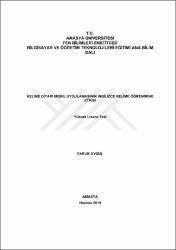| dc.contributor.advisor | Çakır, Recep | |
| dc.contributor.author | Aygül, Faruk | |
| dc.date.accessioned | 2022-03-09T14:56:13Z | |
| dc.date.available | 2022-03-09T14:56:13Z | |
| dc.date.issued | 2019 | |
| dc.identifier.uri | https://tez.yok.gov.tr/UlusalTezMerkezi/TezGoster?key=Mir2lXQK1dkmQ9Ige3PZbiRMYinV82wg82ga2VaKco1eXRz5yM4es9n1AJHKZGnO | |
| dc.identifier.uri | https://hdl.handle.net/20.500.12450/1880 | |
| dc.description.abstract | Bu çalışmanın amacı, yabancı dil olarak İngilizce eğitimini desteklemek amacıyla, kelime öğrenimine yönelik mobil bir öğrenme uygulaması geliştirmek ve geliştirilen bu uygulamanın öğrencilerin akademik başarıları, mobil öğrenmeye yönelik hazırbulunuşlukları ve mobil öğrenme araçlarını kabul düzeyleri üzerindeki etkisini incelemektir. Çalışmada nitel ve nicel yöntem ve yaklaşımları birleştirerek kullanmaya imkan veren çok aşamalı karma yöntem araştırma deseni kullanılmıştır. Mobil öğrenme uygulamasının geliştirilmesi sürecinde öğrencilerin uygulamadan beklentilerini ve ihtiyaçlarını belirlemek için yürütülen ihtiyaç analizi çalışmasında odak grup görüşmeleri gerçekleştirilmiştir. Bu görüşmelerde çalışma grubunu Amasya Üniversitesinde 6 farklı bölüme kayıtlı 14 öğrenci oluşturmuştur. Öğrencilerin görüşlerini öğrenmek amacıyla 7 soruluk yarı yapılandırılmış görüşme formu kullanılmıştır. Bu görüşmelerden elde edilen verilerin analizinde içerik analizi yöntemi kullanılmıştır. İhtiyaç analizinden elde edilen verilere uygun olarak tasarlanan mobil uygulamanın geliştirilmesi sürecinde ADDIE araştırma modelinden yararlanılmıştır. Geliştirilen mobil öğrenme uygulamasının belirlenen değişkenler üzerindeki etkilerini incelemek amacıyla 4 hafta süreli yarı deneysel araştırma yürütülmüştür. Bu araştırmanın çalışma gurubunu Amasya Üniversitesi'nde kayıtlı 61 gönüllü öğrenci oluşturmuştur. Bu öğrencilerden 32'si araştırmanın deney grubunda, 29 ise kontrol grubunda yer almıştır. Deney grubunda yer alan öğrencilere geliştirilen mobil destekli dil öğrenme uygulaması sunulurken kontrol grubu öğrencileri sadece web destekli öğrenme ortamından yararlanmışlardır. Verilerin toplanmasında araştırmacı tarafından geliştirilip geçerlik ve güvenirlik analizleri yapılan Akademik Başarı Testi, Özer ve Kılıç (2017) tarafından geliştirilen Mobil Öğrenme Araçlarını Kabul Ölçeği ve Gökçearslan, Solmaz ve Kukul (2017) tarafından Türkçe 'ye uyarlanarak geçerlik ve güvenilirlik çalışmaları yapılan Mobil Öğrenmeye Yönelik Hazırbulunuşluk Ölçeği ön test ve son test uygulanarak kullanılmıştır. Deneysel çalışmanın sonucunda elde edilen verilerin analizinde SPSS programından faydalanılmış, bağımsız örneklem t-testi ve eşli örneklem t-testi uygulanmıştır. Yapılan ihtiyaç analizinde öğrenciler günlük İngilizce kelimeleri, işbirlikçi, oyunlaştırılmış ve bireyselleştirilebilir bir öğrenme ortamında öğrenmek istediklerini belirtmişlerdir. Rekabet öğesine vurgu yapan öğrenciler uygulamanın aralıklı tekrar yapmasını beklemektedirler. Deneysel süreç sonunda elde edilen verilere göre mobil destekli dil öğrenme ortamının öğrencilerin akademik başarıları üzerinde web destekli öğrenme ortamına göre daha etkili olduğu görülürken; öğrencilerin kabul düzeyleri ve hazırbulunuşlukları üzerinde anlamlı bir etki gözlemlenmemiştir. | en_US |
| dc.description.abstract | The aim of this study is to develop a mobile application for vocabulary learning in order to support the English as a foreign language learning course and to investigate the effects of this mobile application on students' academic achievements, readiness for mobile learning and their levels of acceptance of using mobile learning tools. The study used the multiphase design which allowed to employ both qualitative and quantitative research methods and approaches. In the process of developing the mobile application, focus group interviews were conducted in order to define the students' expectations from and needs of the mobile application in the needs analysis study. The study group consisted of 14 students enrolled in 6 different programs at Amasya University. Semi-structured interview schedule, consisting of 7 questions, was used to learn the students' views. Content analysis method was used in the analysis of the data obtained from these interviews. In the development of the mobile application, designed in accordance with the data obtained from the needs analysis study, ADDIE research model was used. In order to investigate the effects of the developed mobile application on the predefined variables, a 4-week semi-experimental study was conducted with 61 volunteer students studying at Amasya University. 32 of these students were in the experimental group and 29 of them were in the control group. While the students in the experimental group used the mobile language learning environment for learning English vocabulary, the students in the control group only benefited from the web supported learning environment. The data collection instruments were a valid and reliable achievement test, developed by the researcher, The Mobile Learning Tools Acceptance scale, developed by Özer and Kılıç (2017), and The Mobile Learning Readiness scale, adapted to Turkish by Gökçearslan, Solmaz, and Kukul (2017); all of which was applied as pre- and post-tests. In the analysis of the data obtained from the experimental study, independent sample t-test and paired sample t-test were performed with the help of SPSS program. In the needs analysis, the students stated that they wanted to learn English vocabulary used in daily language in a collaborative and individualized learning environment with games. Students put an emphasis on competition and mentioned that they expected the application to do spaced repetition. Findings obtained from the experimental study pointed out that mobile language learning environment was more effective than web supported learning environment, and no significant difference was observed on the acceptance and readiness levels of the students. | en_US |
| dc.language.iso | tur | en_US |
| dc.publisher | Amasya Üniversitesi | en_US |
| dc.rights | info:eu-repo/semantics/openAccess | en_US |
| dc.subject | Eğitim ve Öğretim | en_US |
| dc.subject | Education and Training | en_US |
| dc.title | Kelime diyarı mobil uygulamasının İngilizce kelime öğrenimine etkisi | en_US |
| dc.title.alternative | Effects of the mobile application, Kelime diyarı, on learning English vocabulary | en_US |
| dc.type | masterThesis | en_US |
| dc.department | Enstitüler, Fen Bilimleri Enstitüsü, Bilgisayar ve Öğretim Teknolojileri Eğitimi Ana Bilim Dalı | en_US |
| dc.identifier.startpage | 1 | en_US |
| dc.identifier.endpage | 110 | en_US |
| dc.relation.publicationcategory | Tez | en_US |
| dc.identifier.yoktezid | 559944 | en_US |
| dc.institutionauthor | Aygül, Faruk | |


















